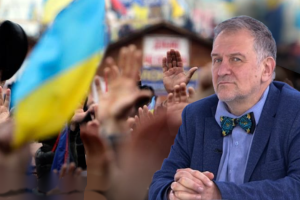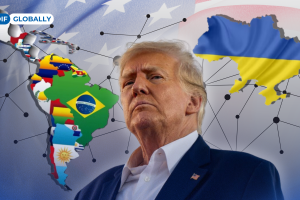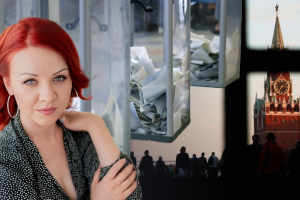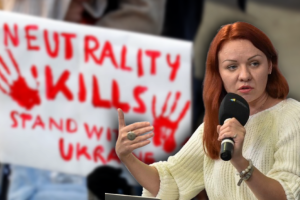This policy brief was prepared exclusively for "Rubryka"
International Developments
- On 4 April, NATO welcomed Finland as its official 31st member state.
The Alliance's expansion appeared to be the direct result of Russian aggressive and unprovoked war against Ukraine.
Finland and Sweden, despite their efficient security and military buildup in recent years, decided that collective defense under Washington Treaty's Article V is the best guarantee for peace and protection.
As Finland has finalized its official accession, Sweden has yet to negotiate its way into the Alliance with Turkey, which tries to use the moment to settle its domestic political issues.
- NATO's foreign affairs ministers agreed on the strategic long-term assistance program for Ukraine.
The initiative aims to support Ukraine's ascension to NATO while boosting its defense capabilities in terms of repelling Russian invasion.
Ministers also agreed on another initiative for each member state to allocate €500 mln yearly as part of the Comprehensive aid package to Ukraine.
Ukraine-NATO Commission also held its first sitting since 2017, with Hungary systematically blocking its work on Budapest's domestic policy demands. Finally, a few weeks ago, NATO Secretary General Stoltenberg insisted the Commission would continue its work despite any protests from Hungary.
The step marks the gradual shift in the Alliance approach to the decision-making process to avoid situations where the whole organization could be paralyzed by a minor voice influenced from abroad.
- The so-called Belarus "president" Lukashenko came to Moscow with an official visit.
In the wake of NATO's expansion, Russia's Putin held a high-ranking leadership meeting of the so-called Russian-Belarus "Union State".
Putin and Lukashenko discussed cooperation issues in the light of growing international sanctions pressure.
Security issues were also among top priorities, as Moscow and Minsk decided to deploy tactical nuclear weapons to Belarus. Russian and Belarusian leadership claimed they are not violating the international non-proliferation norms citing the NATO nuclear-shared practices. However, these arguments proved lame, as there's no bilateral legal document which regulates similar issues between Moscow and Minsk.
Thus, the decision was made to start drafting the "Union State" Security doctrine to put a legal framework to the aggressive joint steps Russia and Belarus are taking.
- French President Macron and EC President Ursula von der Leyen visited China.
After the Chinese leadership presented its so-called "peace plan" and the Chinese top leader visited Moscow, where Russia's Putin expressed his full support, Xi Jinping was willing to meet Western European leaders to read their reaction in person.
Predictably, the visit did not bring any immediate results. However, Mr. Macron and Mrs. von der Leyen seemed to generally agree with Xi Jinping on at least 2 points of upholding the UN Charter on the nations' sovereignty and territorial integrity and on maintaining nuclear security and avoiding escalation of the Russian-Ukrainian war into the nuclear conflict.
The High Representative of the European Union for Foreign Affairs and Security Policy Josep Borrell is expected to visit Beijing on 13-15 April.
It is only afterwards China's Xi could be expected to call Ukrainian President Zelenskyy, and then the official reaction of Chinese leadership could finally start taking shape.
- Numerous US classified military and intelligence documents were leaked on social media.
During the 6–8 April, at least three batches of more than 100 classified "Secret/NoForn" US military and intelligence documents were leaked on various online platforms.
The documents of the first batch were tied to the analysis of the battlefield situation in Ukraine, Russian and Ukrainian losses, preparations for the coming Ukrainian counteroffensive and MLRS HIMARS ammo expenditure rates in the Ukrainian military.
The second batch contained sensitive data on the Bakhmut defense and on US intelligence-gathering capabilities against Russia, revealing the strategic information Washington had on Russian leadership decisions and intentions. It also contained a military and political analysis of the situation in the Indo-Pacific and Middle East geographical theaters.
The third announced part of the leaked documents contained details on the US awareness of what happens inside Ukrainian political and military leadership and the national security apparatus. Roughly the same information was revealed about such US allies as South Korea and Israel.
Some parts of the leaked documents were modified to suit Russian propaganda – for instance, Ukrainian military losses were estimated at 124,500-131,000. In contrast, the Russian losses estimated to be no higher than 17,500 killed in action as of February 2023.
Due to this fact, one of the versions was that the Russian intelligence was behind the leak. The official investigation is pending, while Washington deals with damage assessment.
Conclusions and Recommendations
- The NATO expansion with Finland already a member state and Sweden negotiating its accession with Turkey, marks another major security shift in Europe and the Baltics. Russia's Putin always claimed his main goal was to keep the Alliance at a distance from Russian borders. Nevertheless, it not only drew closer, as Russian neighbors rightfully feared Moscow would sooner or later turn its aggressive hybrid toolkit against them in what Russian leaders view as modern "deterrence".
This further undermines Russia's strategic posture and attempts to present itself internationally as a global superpower player.
- The results of NATO foreign ministers summit and the devil king of the Ukraine-NATO Commission mark the decisiveness the Allies have to not only continue their support for Ukraine's fight against the Russian invasion. It also shapes the future transformations within the Alliance itself, which continues to adapt its mechanisms to the new reality of hybrid threats and all-out aggressive wars by its opponents.
Ukraine should use the moment and proceed with diplomatic work to pave the way for the coming Vilnius Summit and guarantee the maximum support and practical steps toward Kyiv's membership aspirations.
Mr. Stoltenberg once again confirmed that Ukraine would become a NATO member; however this would happen after the Ukrainian victory over the Russian invasion.
- Russia's Putin and Belarus' Lukashenko get together in a high-ranking leadership meeting of the "Union State" of Russia and Belarus.
The meeting was meant to address the pressing issues of international sanctions and the expansion of NATO despite the Kremlin's efforts to thwart it by waging an aggressive war against Ukraine.
Another objective in Putin's mind might be using the whole situation to draw Belarus as close to actual annexation by Russia as possible.
Lukashenko learned well how to play to the Russian propaganda tune of "war against NATO" to block Putin's demands to send the Belarus army to directly assist Russian forces on the battlefields in Ukraine. However, the Kremlin might have come up with the idea of how to overcome this obstacle – by forcing political annexation of Belarus and solidifying the "Union State".
This could be presented to the Russian population as a major strategic victory even despite the military loss in Ukraine, portraying Putin as a restorer of the former "Soviet Union" with its superpower might.
In the coming presidential elections in Russia, this idea will likely become dominant in Russian domestic and foreign policy strategy.
- Chinese leadership is preparing for its strategic game of playing the peace broker role in the Russian-Ukrainian war and guaranteeing itself a central place in the future international security architecture.
However, Xi Jinping seems to be preparing for both optimistic and pessimistic scenarios.
Under the first, the Chinese "peace plan" gets traction along with restoring foreign trade with the EU to the pre-COVID levels, a desired objective voiced by Beijing a few months ago.
Under the second one, the only option to save Chinese leadership from the slowly deteriorating domestic situation is a victorious war, to which Xi Jinping seems to prepare his military commanders. The main question here is which military option China would choose: (1) seizing Taiwan and risking the all-out and exhaustive conflict with the U.S. and its regional allies; or (2) going after the Far Eastern territories of Russia left virtually undefended due to Russian military losses, and potentially defeat, in Ukraine.
- Numerous US classified military and intelligence documents were leaked on social media.
Although an official investigation is underway, several aspects are pointing out this could be a U.S.-led disinformation operation aimed against Russia in the wake of a major Ukrainian counteroffensive.
(a) Though sensitive, most of the information revealed more or less appeared in the public domain months beforehand.
(b) The information revealed proves the US Intelligence Community is most efficient in terms of the diverse threats it has to deal with.
(c) Revealing this information allows Washington to maintain maximum pressure on Russia, Putin personally and his inner circle in general. It is compromising trust and hampering the decision-making process, and ultimately bringing Kremlin to understanding its only option aside from complete military defeat in Ukraine is to withdraw its remaining invasion troops from the sovereign Ukrainian territory.
Revealing those sensitive documents seems like a calculated risk of achieving strategic geopolitical goals under the current circumstances.
______________________________________
This policy brief was prepared exclusively for "Rubryka" as part of a project "russia-Ukraine Conflict: from Full-Scale War to Conflict Resolution and Post-War Reconstruction" implemented in cooperation with the Razumkov Centre with the support of the MATRA program of the Embassy of the Netherlands. The opinions expressed are those of the author(s) only and should not be considered as representative of the Embassy's official position.








